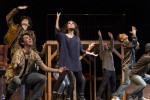Harmonized voices echoed through the north end of Parking Structure 2 on a cold Thursday night. The building’s fluorescent lights became spotlights while the actors danced on the chilled concrete.
The cast of HOOLIGAN Theatre Company’s “Rent” was immersed in character when someone mumbled, “We might have a car situation in 10 seconds.” The group members dispersed as the SUV approached, laughed at their misfortune and immediately returned to the rehearsal as if there had been no interruption.
Premiering in Schoenberg Hall Nov. 19, HOOLIGAN will perform a take on the renowned rock opera that follows a group of bohemian friends living in the East Village of New York City. Through their daily struggles, the characters exemplify how the AIDS epidemic of the late 1980s affected individuals both in and out of the LGBT community. The cast met with the AIDS Ambassadors at UCLA to learn more about the illness and to make the actors’ portrayals of the characters as accurate as possible.
“It’s a show that takes you to the highest of highs with love and happiness, but it also takes you to the lowest of lows with sadness and death,” said Chase Privett, a third-year political science student and director of the production.
As a three-year veteran of HOOLIGAN, Privett said he is excited to direct this quarter’s production of “Rent,” as it is his all-time favorite show. Privett believes the musical is timeless and it accurately depicts reality on stage, while still maintaining a happy ending.
In preparation for the performance, Brett Read-Skyhawk, a third-year physiological science student and executive director of AIDS Ambassadors at UCLA, said the actors were provided with basic facts about AIDS. He said booths will be set up outside of the theater during every production to educate the audience about the disease.
Read-Skyhawk said AIDS was perceived to be a “homosexual disease” in the late 1980s and early 1990s.
“There was a ton of stigma back in the day, and there is definitely still stigma now, but I think significantly less now that we know more about the disease,” Read-Skyhawk said.
Professor Neil Garg, vice chair of the UCLA chemistry and biochemistry department, as well as an avid fan of “Rent”, said AIDS was often associated with sex and celebrities back in the ’90s.
“Around the time, HIV was a death sentence,” Garg said.
Due to advances in medicine, such as the development of the anti-AIDS drug AZT, he said this stigma has lost its intensity, as now the disease can be treated.
After directing the show and learning from the AIDS Ambassadors, Privett said he believes AIDS is still a frightening disease, but also that society has taken it upon itself to combat the surrounding stigmas through acceptance.
“We will still love someone with HIV or AIDS unabashedly,” Privett said.
Paul Butcher, a third-year music history student, plays Roger Davis, a man who is HIV-positive. He said he identifies with the message of “Rent” in promoting equality in the name of love. It encourages everyone to live in the moment and to remember the sacredness of life, he said.
“My favorite line in the whole play is, ‘They say that it’s true you can’t buy love, but you can rent it,’ meaning you get love from certain people while you are (alive) and you have to enjoy it in that moment,” Butcher said.
To encompass Roger’s personality and illness, Butcher said he has had to connect with him on an emotional level.
“I just tell myself that I am that character, and that when I go on stage that’s who I am,” Butcher said. “I leave Paul and Paul’s life behind.”
Aaron Fish, a fourth-year mathematics student, explained how difficult it has been for him to portray a character with AIDS. He said his character Tom Collins must retain hope in dealing with the unavoidable, tragic future in a time clouded by misconceptions of the disease.
“He has to live through this inevitability of death,” Fish said. “There is only so much time left for him, and that changes your outlook on life entirely.”
Although Butcher and Fish said embodying their characters was a challenge, they also both found it incredibly rewarding and learned a valuable lesson.
“It’s not about if you have AIDS or if you are different … it’s about: You are a human being and you deserve love,” Butcher said.
